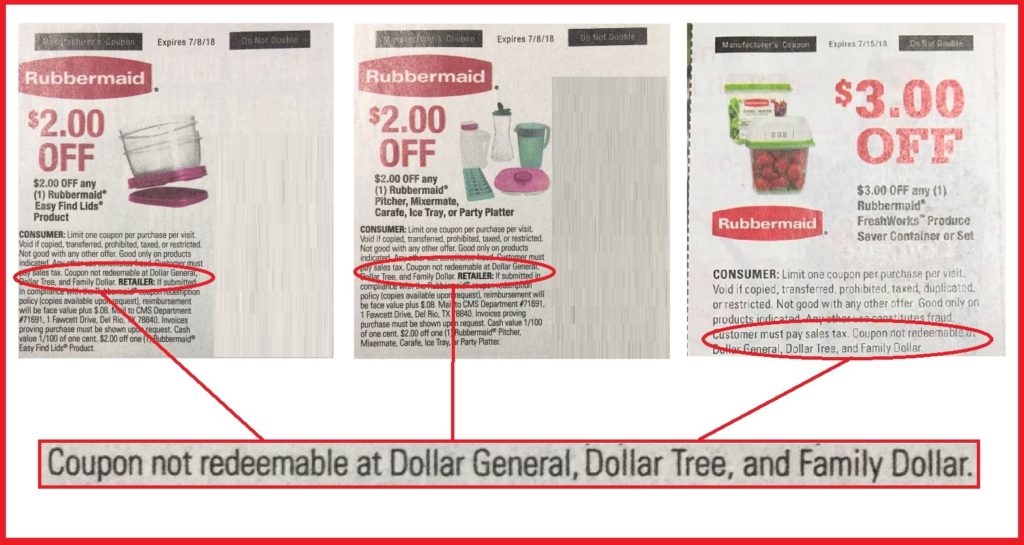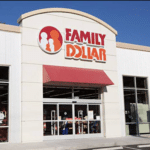Before you use any of the Rubbermaid coupons that appeared in the SmartSource coupon inserts this past Sunday and the Sunday before, better read all of the fine print. There’s a curious new restriction, unlike any that most shoppers have seen before – “Coupon not redeemable at Dollar General, Dollar Tree, and Family Dollar”.
Discriminating against dollar stores – is that fair? Turns out there are questions about whether it’s even legal.
Rubbermaid manufacturer Newell Brands has not responded to several inquiries about its intentions in implementing the new coupon language. Is it because the dollar stores sell Rubbermaid products at lower price points, and Newell doesn’t want to provide too large of a discount or give away free products? Or is it because dollar store shoppers are misusing Rubbermaid coupons and the stores are letting them get away with it?
If it’s the latter, then Newell may have some valid concerns. Dollar stores – particularly Dollar General – haven’t always had the best reputation when it comes to ensuring coupons are used correctly. Dollar General was once sued by a former employee who accused the retailer of knowingly accepting coupons on products for which they were not intended. By flat out refusing to allow their coupons to be used at dollar stores, Newell can ensure they will only be redeemed at retailers that are more scrupulous in their coupon acceptance procedures.
That said, Dollar General has been cracking down lately. It recently revised its coupon policy and informed staffers that they need to ensure that coupons are being used properly. So Newell’s move may be a little too late to have an impact.
But if fraud is not the reason for Newell’s new coupon language, and it’s simply because it doesn’t want its higher-value coupons used at lower-priced dollar stores, then its concern may be somewhat misguided. A major error in the bar code of a January Rubbermaid coupon allowed shoppers to get $3 off a purchase without buying any Rubbermaid products at all. Ethics-challenged couponers took advantage of that coupon – and not just at the dollar stores. So preventing the coupon from being used at dollar stores wouldn’t have solved that problem.
Now, the newest Rubbermaid coupons are allowing shoppers to get cheap, free and “moneymaker” Rubbermaid products – legitimately and otherwise – at stores all across the country. At least one of the coupons appears to be scanning on any Rubbermaid product, not just the one specified on the coupon.
But there are legitimate deals, too. Many shoppers are boasting about getting overage by buying $1.50 Rubbermaid ice trays or MixerMate containers at Walmart using a coupon offering “$2 off any Rubbermaid pitcher, MixerMate, carafe, ice tray or party platter”. Kroger shoppers are using “$2 off any Rubbermaid Easy Find Lids product” coupons on Easy Find Lids containers that are currently on sale for $1.79. And Meijer has several Rubbermaid products regularly priced under $2 that can be obtained for free using one of the $2 Rubbermaid coupons.
So if Newell thought preventing its coupons from being used at dollar stores would protect it from giving away cheap or free products – it was mistaken.
Whatever Newell’s reason for going with the new coupon language, it may not even be legal. By calling out specific retailers by name and refusing to allow its coupons to be used there, Newell is encouraging coupon-carrying consumers to shop at the dollar stores’ competitors instead. And that could be considered an anticompetitive practice.
While it doesn’t apply in this specific situation, the Code of Federal Regulations spells out just such a scenario in describing enforcement of the Federal Alcohol Administration Act. Coupons, it says, are permissible only if “all retailers within the market where the coupon offer is made may redeem such coupons”, which means manufacturer’s coupons cannot be redeemable only at specific retailers.
When it comes to non-alcoholic items, though, federal law is somewhat less clear. The Robinson–Patman Act says it’s unlawful “to discriminate in price between different purchasers… where the effect of such discrimination may be substantially to lessen competition”. It goes on to say that it’s unlawful “to discriminate in favor of one purchaser against another purchaser or purchasers of a commodity bought for resale (by furnishing) any services or facilities… upon terms not accorded to all purchasers on proportionally equal terms”.
There’s some debate about whether offering coupons constitutes price discrimination. As long as dollar stores and other retailers are charged similar wholesale prices for Rubbermaid products, Newell likely cannot be said to be “discriminat(ing) in price between different purchasers”, even if the end result is a difference in the price ultimately paid by consumers. But if the coupons that Newell offers to consumers can’t be used at certain specific retailers, there could be a case to be made that Newell is lessening competition and discriminating against Dollar General, Dollar Tree and Family Dollar by denying them access to “services or facilities” that are only available to their retail competitors.
That is perhaps why few manufacturers have ever put such specific retail restrictions on their coupons. Some coupons have more generic restrictions, such as “not redeemable at club stores”. But a search through the coupon archives yields only a couple of recent examples of specific retailers being excluded by name. In 2013, Jennie-O issued coupons for turkey bacon that stated “Not redeemable at Dollar Tree”. But that restriction seemed designed to emphasize that Dollar Tree didn’t carry the 12-ounce package for which the coupon was meant, so you couldn’t really argue discrimination there.
Libby’s, meanwhile, has been printing “not redeemable at Dollar General” on its coupons lately. It’s perhaps unlikely that coupons for inexpensive canned vegetables are being misused at Dollar General on a grand scale, so it’s more likely that Libby’s doesn’t want to give away big discounts at a store where its products are frequently on sale for less than 50 cents apiece as it is. Like Newell, Libby’s has not responded to a request for comment about the rationale for its restriction – or whether it’s confident the restriction is within the law.
So if you want to get inexpensive or free Rubbermaid products, there are plenty of places to do it. Just not at Dollar General, Dollar Tree or Family Dollar – at least for now. While we await some kind of explanation from Newell, the best we can all do is await the next batch of Rubbermaid coupons, to see whether these new restrictions against dollar stores hold up.












My Dollar Tree does not accept any manufacturer or Ecoupons at all. Even when I show them a copy of their coupon policy. I live in a heavily Hispanic area and most if not all of the employees do not speak English so they just tell you No Take because they cannot understand what the coupon says.
The Dollar Tree one might makes sense, simply since they sell everything at $1 (or sometimes 2 or 3 for $1), so it would be hard to use a $2 or $3 coupon there, even if they stocked the correct items.
Not so much the other two, though (as they do have items that are higher priced).